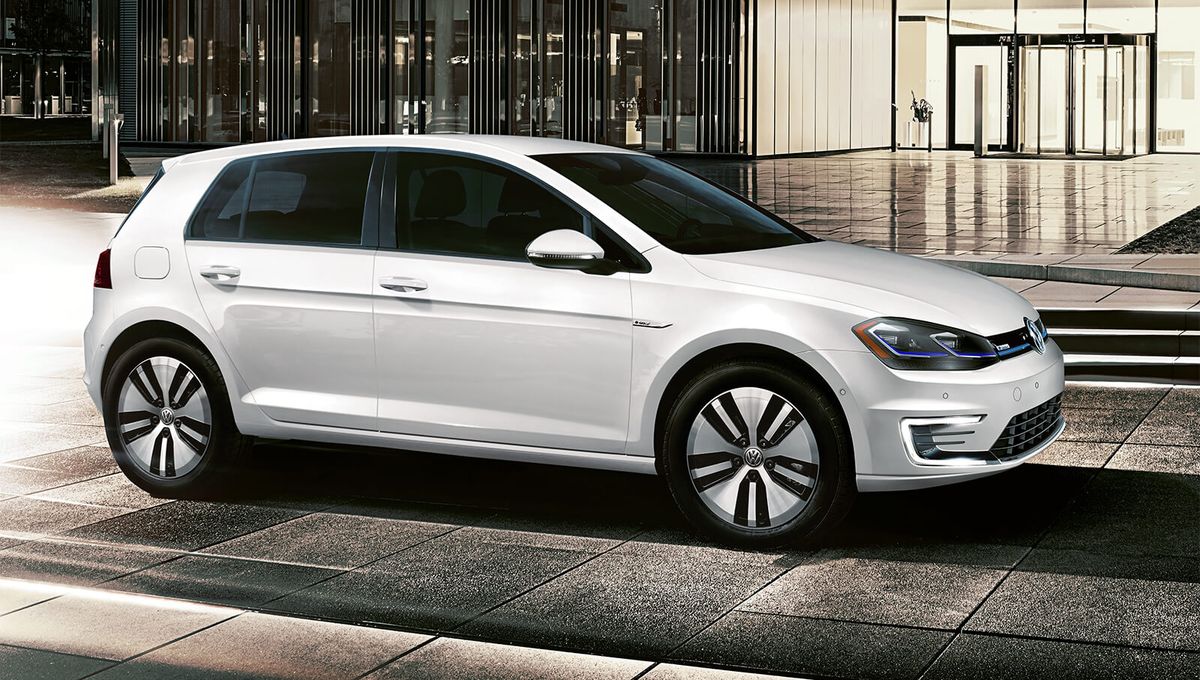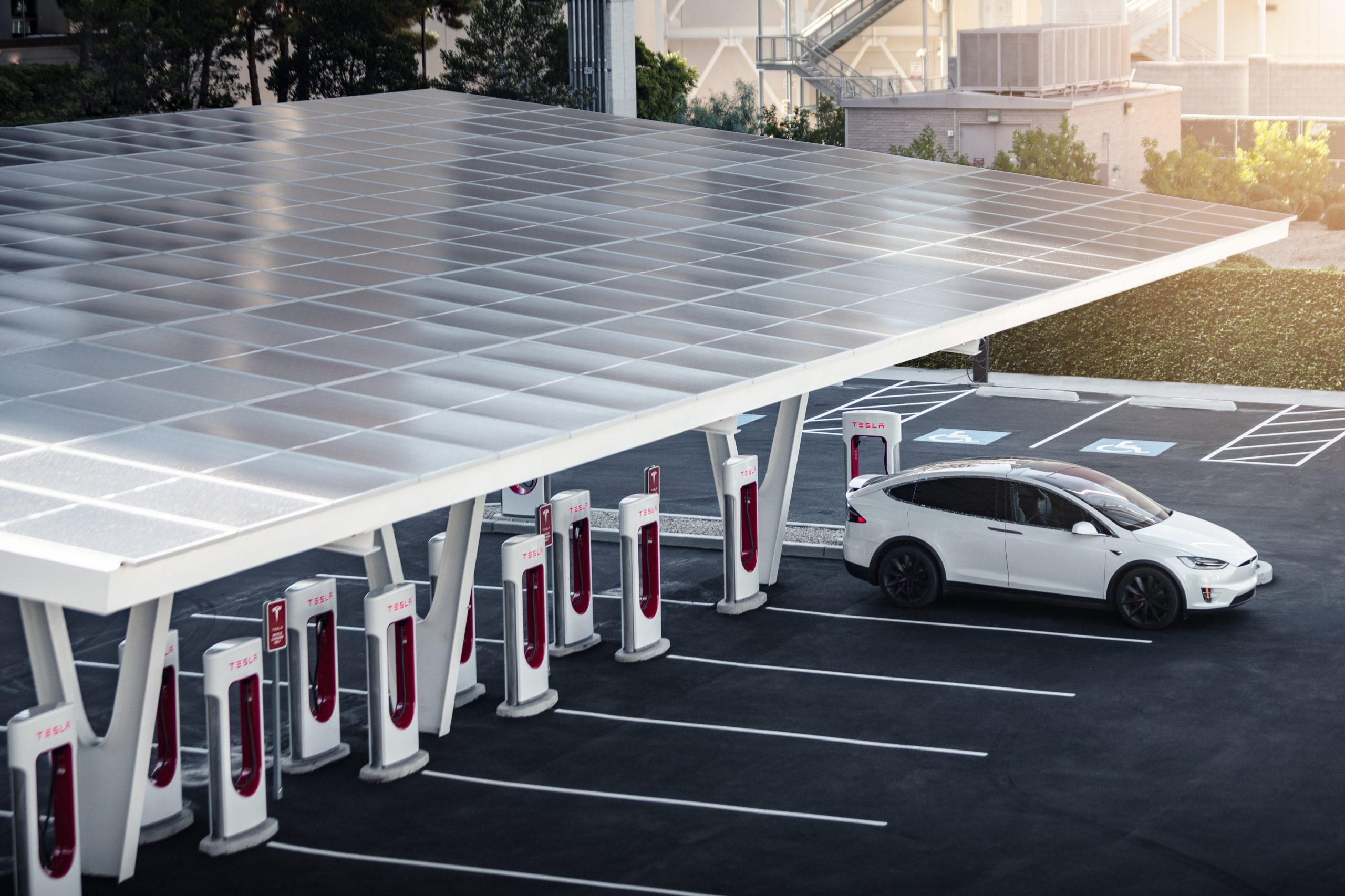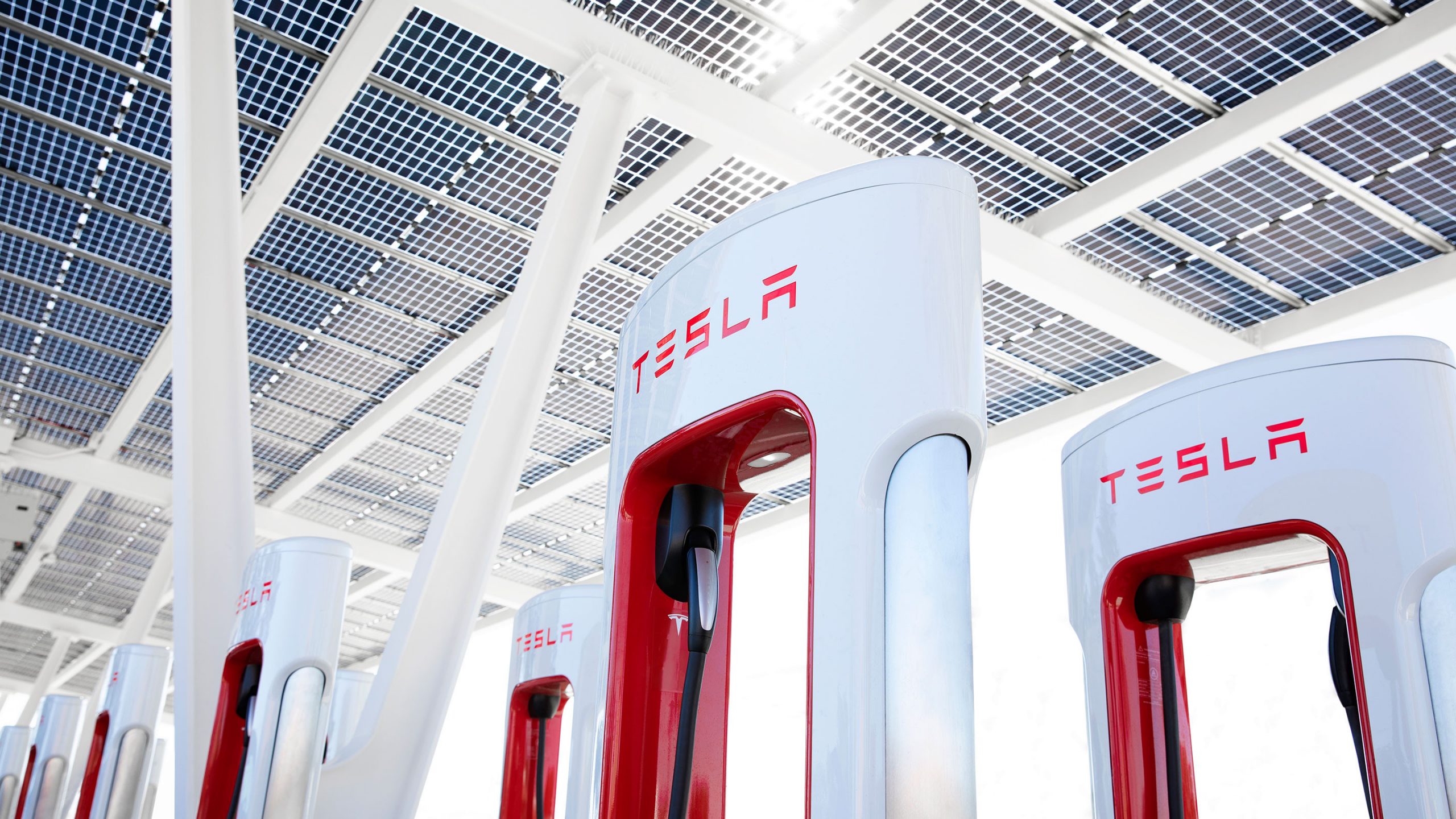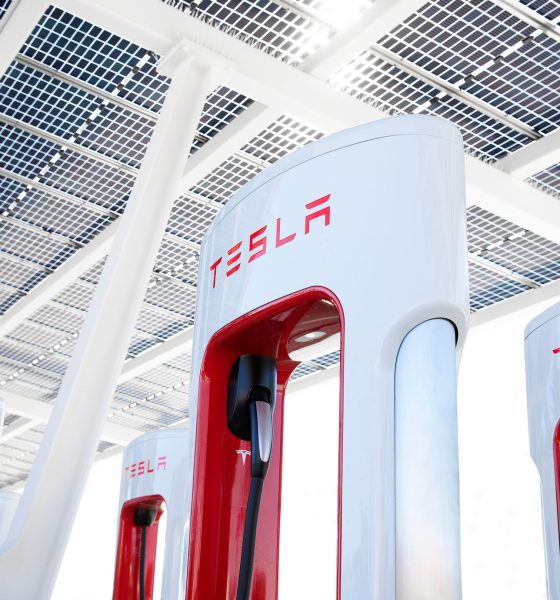For years, Tesla has been the subject of various statements by rival automakers that claim their company is superior. Electric vehicle tech, charging infrastructure, range, and performance have been where these companies have argued they are stronger and more robust a competitor than Tesla in the space.
Now, those same competitors are essentially admitting that without Tesla, they cannot succeed, and it has culminated in the war for EV charging ending before it has really even begun.
Perhaps the most significant and most important variable in the growth of electric vehicles is charging. We can argue that range is not because, for years, people have driven electric vehicles like Volkswagen’s eGolf and the Nissan Leaf, which offer low range ratings of just 125 and 150 miles, respectively.
Credit: Volkswagen
We can argue that performance is not because not everyone needs or even wants speed and acceleration. While tech is important, it is not a necessity for all drivers, as some continue to drive vehicles with tape decks and no power windows.
Everyone who drives an EV needs a place to charge. While home charging solutions are suitable for everyone, that does not solve the issue that lies behind a long commute or road trip. People need adequate charging infrastructure to make driving an EV suitable for things past a car being a daily driver. Unfortunately, while it is the most important, at least in my opinion, it has not been the variable that automakers have focused on exclusively.
Instead, automakers have boasted world-class 0-60 MPH acceleration times, range ratings that, while incredibly high, do not necessarily offer any advantages to the driver, and a look or design that is sure to be the next “Tesla killer.” Those are all great metrics to have and hold, but where it really matters is where these companies have fallen short.
But as the old saying goes: if you can’t beat them, join them.
Ford was the first major automaker to readily admit that, without Tesla’s industry-leading charging infrastructure, its plans for EV prowess would likely come to a screeching halt. They, along with everyone else who is mentioned, will not only adopt NACS but will also gain access to 12,000 Supercharger locations. General Motors, which has garnered more attention from the Biden Administration than Tesla for its “leading” EV efforts, was next.
(Credit: Tesla)
The latter was an unlikely partnership that many likely did not think was coming but to succeed in this business, one where the leader is overwhelmingly obvious and so far ahead of the others, relationships must be leveraged, and vendettas must be set aside. Companies can say they’re better than Tesla in EVs, but those who have followed the sector for any length of time must know it was all rhetoric.
But, the thesis of this is not to hound the fact that companies had to swallow their pride. It is about Tesla winning the battle of EV charging.
After Volvo vowed to make the switch to Tesla’s NACS connector in 2025 yesterday, and with plenty of others mulling over the advantages, it is clear that companies are interested in making Tesla’s strategy the U.S. standard. Even agencies like the SAE are taking expedited measures to ensure the NACS connector gains that recognition.
Charging companies are on board as well, and it is overwhelmingly clear that when it comes to adopting EVs and their strategies or accessories, Tesla is who the others are aiming to be like.
The battle for EV charging prowess has not even begun. But it has already ended, and it is better this way. If Ford, GM, Volkswagen, and others operated their own gas stations for the past century, cars would have been entirely too competitive and would have never moved forward. It is time for differences to be set aside and for the leader to lead, and Tesla is finally getting its chance.
I’d love to hear from you! If you have any comments, concerns, or questions, please email me at joey@teslarati.com. You can also reach me on Twitter @KlenderJoey, or if you have news tips, you can email us at tips@teslarati.com.

News
Tesla ships out update that brings massive change to two big features
“This change only updates the name of certain features and text in your vehicle,” the company wrote in Release Notes for the update, “and does not change the way your features behave.”

Tesla has shipped out an update for its vehicles that was caused specifically by a California lawsuit that threatened the company’s ability to sell cars because of how it named its driver assistance suite.
Tesla shipped out Software Update 2026.2.9 starting last week; we received it already, and it only brings a few minor changes, mostly related to how things are referenced.
“This change only updates the name of certain features and text in your vehicle,” the company wrote in Release Notes for the update, “and does not change the way your features behave.”
The following changes came to Tesla vehicles in the update:
- Navigate on Autopilot has now been renamed to Navigate on Autosteer
- FSD Computer has been renamed to AI Computer
Tesla faced a 30-day sales suspension in California after the state’s Department of Motor Vehicles stated the company had to come into compliance regarding the marketing of its automated driving features.
The agency confirmed on February 18 that it had taken a “corrective action” to resolve the issue. That corrective action was renaming certain parts of its ADAS.
Tesla discontinued its standalone Autopilot offering in January and ramped up the marketing of Full Self-Driving Supervised. Tesla had said on X that the issue with naming “was a ‘consumer protection’ order about the use of the term ‘Autopilot’ in a case where not one single customer came forward to say there’s a problem.”
This was a “consumer protection” order about the use of the term “Autopilot” in a case where not one single customer came forward to say there’s a problem.
Sales in California will continue uninterrupted.
— Tesla North America (@tesla_na) December 17, 2025
It is now compliant with the wishes of the California DMV, and we’re all dealing with it now.
This was the first primary dispute over the terminology of Full Self-Driving, but it has undergone some scrutiny at the federal level, as some government officials have claimed the suite has “deceptive” names. Previous Transportation Secretary Pete Buttigieg was one of those federal-level employees who had an issue with the names “Autopilot” and “Full Self-Driving.”
Tesla sued the California DMV over the ruling last week.
News
Tesla workers push back against Giga Berlin unionization
“IG Metall did not succeed in Giga Berlin‘s works council election earlier today. The union share was reduced from nearly 40% in 2024 to 31% in 2026! This is a clear message by the Giga Berlin team towards an independent co-determination! The list called Giga United, led by the current chairwoman, Michaela Schmitz, received the most votes with more than 40%! Good news for Giga Berlin!”

Tesla workers pushed back against unionization efforts at Gigafactory Berlin, and over the past few years, there has been a dramatic decrease in interest to unionize at the German plant.
Gigafactory Berlin Plant Manager André Thierig announced on Wednesday that IG Metall, the European union group, saw its share reduce from 40 to 31 percent in 2026 as employees eligible to vote on the issue. Instead, the Giga Berlin team, known as Giga United, received the most votes with more than 40 percent.
BREAKING! 🚨
IG Metall did not succeed in Giga Berlin‘s works council election earlier today. The union share was reduced from nearly 40% in 2024 to 31% in 2026!
This is a clear message by theGiga Berlin team towards an independent co-determination!
The list called Giga…
— André Thierig (@AndrThie) March 4, 2026
Thierig gave specific details in a post on X:
“IG Metall did not succeed in Giga Berlin‘s works council election earlier today. The union share was reduced from nearly 40% in 2024 to 31% in 2026! This is a clear message by the Giga Berlin team towards an independent co-determination! The list called Giga United, led by the current chairwoman, Michaela Schmitz, received the most votes with more than 40%! Good news for Giga Berlin!”
There were over 10,700 total employees who were eligible to vote, with 87 percent of them turning out to cast what they wanted. There were three key outcomes: Giga United, IG Metall, and other notable groups, with the most popular being the Polish Initiative.
The 37-seat council remains dominated by non-unionized representatives, preserving Giga Berlin as Germany’s only major auto plant without a collective bargaining agreement.
Thierig and Tesla framed the outcome as employee support for an “independent, flexible, and unbureaucratic” future, enabling acceleration on projects like potential expansions or new models. IG Metall expressed disappointment, accusing management of intimidation tactics and an “unfair” campaign.
The first election of this nature happened back in 2022. In 2024, IG Metall emerged as the largest single faction with 39.4 percent, but non-union lists coalesced for a majority.
But this year was different. There was some extra tension at Giga Berlin this year, as just two weeks ago, an IG Metall rep was accused by Tesla of secretly recording a council meeting. The group countersued for defamation.
Tesla Giga Berlin plant manager faces defamation probe after IG Metall union complaint
This result from the 2026 vote reinforced Tesla’s model of direct employee-management alignment over traditional German union structures, amid ongoing debates about working conditions. IG Metall views it as a setback but continues advocacy. Tesla sees it as validation of its approach in a competitive EV market.
This outcome may influence future labor dynamics at Giga Berlin, including any revival of expansion plans or product lines, which Musk has talked about recently.
News
SpaceX President Gwynne Shotwell details xAI power pledge at White House event
The commitment was announced during an event with United States President Donald Trump.

SpaceX President Gwynne Shotwell stated that xAI will develop 1.2 gigawatts of power at its Memphis-area AI supercomputer site as part of the White House’s new “Ratepayer Protection Pledge.”
The commitment was announced during an event with United States President Donald Trump.
During the White House event, Shotwell stated that xAI’s AI data center near Memphis would include a major energy installation designed to support the facility’s power needs.
“As you know, xAI builds huge supercomputers and data centers and we build them fast. Currently, we’re building one on the Tennessee-Mississippi state line. As part of today’s commitment, we will take extensive additional steps to continue to reduce the costs of electricity for our neighbors…
“xAI will therefore commit to develop 1.2 GW of power as our supercomputer’s primary power source. That will be for every additional data center as well. We will expand what is already the largest global Megapack power installation in the world,” Shotwell said.
She added that the system would provide significant backup power capacity.
“The installation will provide enough backup power to power the city of Memphis, and more than sufficient energy to power the town of Southaven, Mississippi where the data center resides. We will build new substations and invest in electrical infrastructure to provide stability to the area’s grid.”
Shotwell also noted that xAI will be supporting the area’s water supply as well.
“We haven’t talked about it yet, but this is actually quite important. We will build state-of-the-art water recycling plants that will protect approximately 4.7 billion gallons of water from the Memphis aquifer each year. And we will employ thousands of American workers from around the city of Memphis on both sides of the TN-MS border,” she noted.
The Ratepayer Protection Pledge was introduced as part of the federal government’s effort to address concerns about rising electricity costs tied to large AI data centers, as noted in an Insider report. Under the agreement, companies developing major AI infrastructure projects committed to covering their own power generation needs and avoiding additional costs for local ratepayers.










